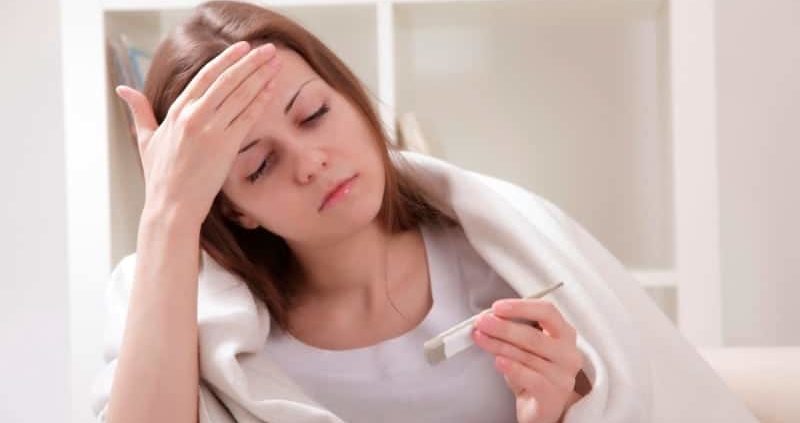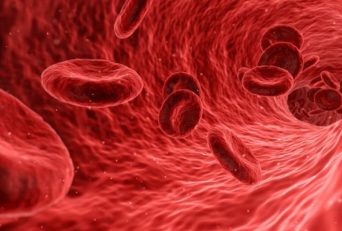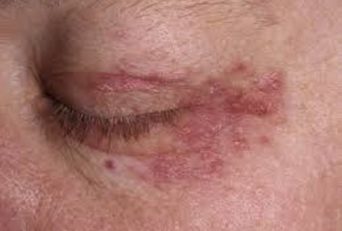Dengue fever is a viral fever caused by any one of the four dengue-related viruses such as DEN-1, DEN-2, DEN-3, and DEN-4. These viruses are single positive-stranded RNA viruses and also responsible for yellow fever.
There are few effective home remedies are there for dengue fever that you should try.
There are 1 in 2 people are at risk of dengue fever worldwide. It is a mosquito-borne disease and more common than you think. People of all ages can be affected by dengue disease if bitten by the infected mosquito.
There are two types of mosquitoes which are responsible for the dengue disease known as Aedes aegypti and Aedes albopictus. Aedes aegypti is famous as the yellow fever mosquito whereas Aedes albopictus is famous as the Asian tiger mosquito.
Dengue fever lasts from 2 to 7 days. It can be biphasic. Some alternative names of dengue fever are breakbone fever, dengue-like disease, and o’nyong-nyong fever.
Dengue came to the knowledge of the health experts about 200 years ago. In recent decades Dengue has spread its wings dramatically. Around 40%-50% of the population of the whole world is at the risk of Dengue disease.
Previously, only 1%-3% of people were affected, but now it is found in more than 100 countries worldwide. So the percentage level of Dengue affected patients growing more.
Table of Contents
Transmission of Dengue Virus
Dengue is the fastest-growing disease transmitted by mosquitoes.The female mosquito transmitted the dengue disease from person to person through biting the dengue-infected patient
When a mosquito bites a dengue-infected person, it takes seven days or more to replicate the dengue virus in that mosquito. Dengue fever transmits through the exposure to infected blood, organs, and bone marrow. It can transfer to the baby through breastfeeding.
Dengue fever is not at all contagious. There is no evidence of transmission from one person to another. There is no evidence of sexual transmission of dengue fever also.
The travelers infected with dengue fever also transmits dengue to the dengue free countries.
Causes Of Dengue Fever
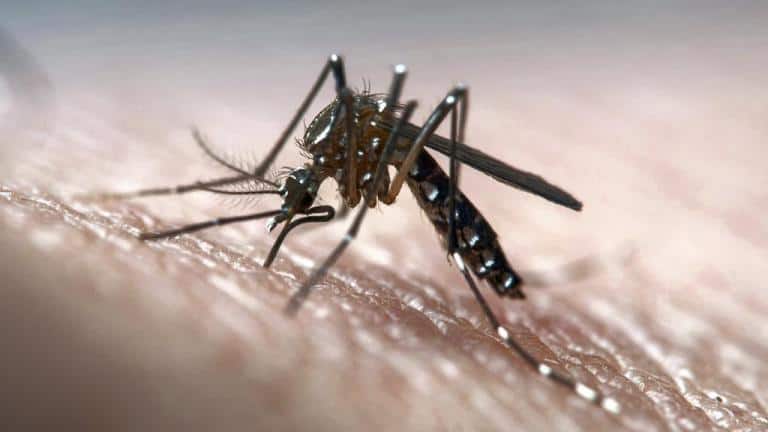
- The main cause of Dengue fever is the biting of a dengue-infected female mosquito.
- A mosquito becomes infected when it bites a dengue-infected person.
- It takes 3-14 days to generate the dengue virus in the blood of that mosquito after biting.
- The infected mosquito transmits the dengue virus to another person through biting.
- The mosquito finds nasty places to lay eggs and increases in multiple.
- As a result, dengue virus spreads rapidly in that particular area.
- Another cause of dengue fever is the traveling of dengue-prone areas.
Symptoms Of Dengue Fever
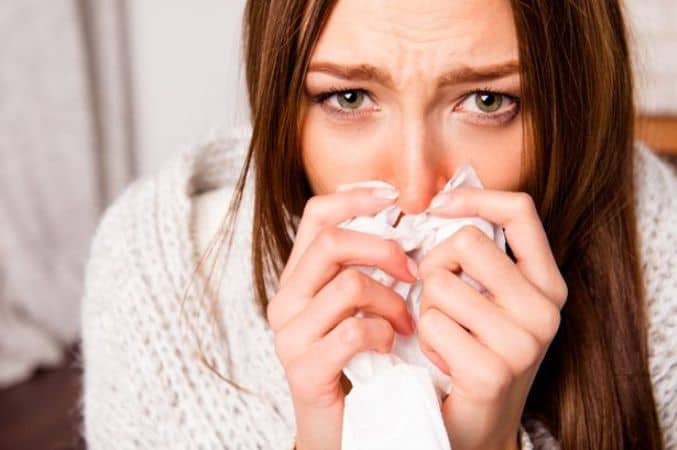
Dengue fever is a debilitating and painful disease. The symptoms of this disease have a lot of similarity with influenza and other viral diseases. So sometimes it becomes difficult for the health experts to diagnose the dengue fever. As a result, the normal dengue fever can lead to dengue hemorrhagic fever. In extreme cases, it becomes fatal also.
The symptoms of dengue fever start after 3-14 days of the biting of an infected mosquito. The symptoms last up to 4-7 days. Let’s know all the symptoms of dengue fever in brief.
1.High Fever
The normal temperature of a human body is 98.6 F. When you get affected by dengue fever the temperature rises to 104F to105F. As a result, you do suffer from high fever.
Dengue fever starts with sudden high fever with 4-7 days of the infection. The fever may be of two episodes or two waves. This type of fever is known as biphasic fever.
2.Rashes All Over The Body
With high fever red and flat rashes appear all over the body of the patient. These rashes become more prominent just like as measles after 2-4 days. You may feel the high sensitivity of the skin and can feel very uncomfortable.
These rashes of dengue fever are known as macular or maculopapular rashes. These rashes may cover the whole body of you except the face.
The rashes even appear on the palms and the bottom of the feet also. Sometimes you may feel severe itching for these rashes.
3.A headache
In dengue fever, the patient experiences a severe headache because of high fever. Sometimes this terrible headache becomes unbearable also. In case of children, they start crying loudly because of pain.
4.Chills
In dengue fever, the patient may start to shiver sometimes and may begin sweating as well. This fluctuated condition is known as chills. It causes due to high fever.
5.Acute Retro-orbital Pain
In dengue, the patient goes through acute Retro-orbital pain which means severe pain behind the eyes. It causes due to the inflammation of the sinus cavities. You may go through worst feelings in the movement of eyes and feels pressure in the eye motion also.
6.Joint And Muscle Pain
The patient goes through severe joint, bone, and muscle pain. The pain occurs mostly in lower back, legs, and arms of the patient. So dengue fever is otherwise known as Breakbone fever also.
7.Purpura
Some purple colored spots appear on the skin of the dengue-affected patient. These spots do not blanch at applying pressure to them. This condition of the skin is called as Purpura.
These spots cause due to the bleeding underneath the skin of the patient. It happens because of the acute disorder of the platelets in the blood.
8.Rapid Decrease In Platelet Count
The rapid decrease in platelet count is the most dangerous condition of the dengue patient. Platelets are present in large numbers in your body. They are present in the blood cells and much tinier than white and red blood cells.
The work of platelet is to bind together to stop bleeding when you get injured. In dengue fever, these platelets get destroyed in the bloodstream of the patient. When these platelets decrease the number 150,000, it becomes fatal for the patient.
9.Mucosal Bleeding
The rapid decrease of platelet count in dengue fever causes small hemorrhage in the mucous membrane of the patient. As a result, the blood vessels become ruptured. These ruptured blood vessels escape blood to the tissues which cause mucosal bleeding.
10.Abdominal Pain
With dengue fever, the patient goes through severe abdominal pain due to gastritis. The patient also experiences persistent vomiting, nausea, diarrhea, and coffee ground blood. The patient may feel giddy and dizziness also. Some patients may complain about the loss of appetite due to abdominal pain.
11.Some Other Symptoms Of Dengue Fever
Some other common symptoms of dengue fever are
- Weakness, lethargy, and malaise.
- A sore Throat
- Altered taste sensation
- A cough
- Nasal Stuffiness
- Swollen Lymph Nodes
- Fatigue
- Sudden onset of fever
- Cold or Clammy skin
- Difficult in breathing
Critical Period Of Dengue Fever
The symptoms of dengue fever occur in two phases. All the symptoms start from 2-7 days after mosquito biting. The 1st 3-4 days are the early phase of dengue fever and the next 3-4 days are the later phase.
This later phase of the dengue fever is the most critical period for the patient and known as Dengue Haemorrhagic Fever. Let’s know everything about the dengue hemorrhagic fever.
Dengue Hemorrhagic Fever(DHF)
Dengue hemorrhagic fever is the acute form of dengue infection. It may be fatal without proper clinical treatment.
Causes Of DHF
A dengue fever converts to DHF if you are affected by dengue for the 2nd or 3rd time. Once you have suffered from dengue fever, the virus will remain in your body for the lifetime and becomes multiple in your RBC. As a result, the immunity power of your body becomes weak to fight against some foreign bacteria.
If you have affected by the DEN-1 virus once, next time, the DEN-2 virus puts you at an increased danger of DHF. There is also a chance of getting affected by all the four DEN viruses within your lifetime.
Who May Get Affected By DHF
- The DHF has majorly seen the children under 15 years of age.
- The pregnant women also get infected by DHF, and the virus transmits to the fetus also.
- The infants also come under the risk through breastfeeding from a DHF infected mother.
- Some people who have a compromised immune system also at the risk of DHF.
Symptoms Of Dengue Haemorrhagic Fever
The symptoms of DHF starts when you are in a relaxation that you are recovering. But actually, in this period you may get infected by the most critical condition of the dengue fever as in DHF. Let’s know about the symptoms of DHF.
- The dangerous or risky period of dengue fever begins after the diminishing of fever. This period is known as defervescence and is the 1st symptom of DHF.This period lasts for 24-48 hours.
- Most of the dengue-affected patients clinically progress during this period.
- A marked increase in vascular permeability happens which aggravates dengue due to substantial plasma leakage.
- The severe leakage of plasma causes shortness of breath and chest pain. It happens because of the build-up of excess fluid around the lungs of the patient in DHF.
- The patient develops hypotension which causes a rapid decrease in systolic blood pressure.
- Once the systolic blood pressure declines worsen, the cardiac function of the patient may cause “death.”
- The patient may develop acute hemorrhagic manifestation in DHF.
- The symptoms of blood in stool, blood in vomiting, and blood in urine happens due to prolonged shock in the patient.
- In normal bleeding, it does not cause any pain during urination, but it becomes painful to pass the blood clots in severe cases. This condition of the patient is known as Hematuria.
- The patient goes through Hypovolemic shock loss of more than 20% of blood or fluid supply in the body when get affected by DHF.
- In DHF, the heart becomes unable to pump the adequate amount of blood to your body which may cause multi-organ failure.
Diagnosis Of Dengue Haemorrhagic Fever
The health experts diagnose the Haemorrhagic dengue fever after a close observation of the signs and symptoms. When a person gets infected with dengue fever, the doctors regularly observes the condition of the patient.
- After seeing a little sign of DHF, your doctor starts to check your blood pressure frequently.
- The doctor starts to examine your eyes, skin, and glands.
- They do blood tests and perform coagulation studies.
- They take an x-ray of your chest which shows the build-up of fluid in chest and lungs.
- The doctor asks about your past health history and your lifestyle.
Clinical Treatment Of DHF
The treatment of dengue hemorrhagic fever depends upon the severity of the disease. The main aim of the treatment is to control the disease to be more severe and manage the symptoms simultaneously.
- When the DHF becomes more severe, you may need the Drip or IV(Intravenous) fluid supplementation.
- Your doctor prescribes you over-the-counter medicines to get relief from the pain.
- In case of severe dehydration, you may need the transfusion of blood also.
- Your doctor provides you with electrolytes therapy and oxygen therapy.
- The doctor refers to the serum studies and the tourniquet test.
- The doctor carefully monitors your blood pressure with skilled nursing.
- They regularly monitor the response of your body towards the treatment.
After-Complications Of DHF
There are some possible complications you may face after infected with a Dengue Haemorrhagic fever. You may go through:
- the damage of livers
- the brain disease or the destruction of residual brain
- Shock and seizures
Preventions For Dengue Fever
To prevent yourself from mosquito biting is the most important and best way to protect yourself from Dengue. It is essential to protect your house and surroundings from the breeding of mosquitoes.
You have to take some preventive steps to restrict the generation of mosquitoes because they love scanty and watery areas to breed. Let’s follow some preventions.
1.Remove Stagnant Water
Don’t let any water gather anywhere inside or outside of your house. Always try to drain the stocked water from any gutters or garbage cans of your house.
Change the water of the coolers, and flower pots regularly. You must drain the collected water from rain and sprinklers too. You must clean the birdbaths and pet bowls regularly.
Don’t let the water remain in the pots of your indoor plants. You must loosen the soil of the potted plants on a regular basis to prevent puddles from the surface.
2.Maintain Your Swimming Pool
It is essential for the proper maintenance of the swimming pool to avoid the generation of dengue-infected mosquitoes.
Try to maintain the pool chemistry properly by the professionals. You must change the water of the pool on a regular basis.
Some of you may have a plastic swimming pool. Don’t let the water remain there. Empty the plastic pools after each use.
Don’t let the children use a public pool if you are living a dengue-prone area. You may allow your children after a proper investigation about the public swimming pool.
3.Discard All The Unused Items
Discard all the old drums, old tyres, unused bottles, pots, cans, pans, etc. from your house. Throw away all the broken appliances to keep clean your house.
Scrub all the unused containers which you may use later, to remove the eggs of the mosquitoes. You must repair all the broken windows, screens, porches, patios, and doors of your house to restrict the trespassing of the mosquitoes.
Try to make any possible structural barriers for the entrance of the mosquitoes.
4. Do Proper Netting
Mosquitoes can bite you during sleeping. Proper netting is the best idea to protect yourself.
Use the mosquito nets treated with non-poisonous insecticides because mosquitoes can bite through the net if any part of your body touches the net-wall.
Non-poisonous insecticides are safe for your children, and they will not let other insects enter your room. Use separate nets for the babies for more safety.
5.Use Mosquito Repellants
Some mosquito repellants are available in stores to protect yourself from mosquito-biting. You can get the repellants in many forms like cream, lotion, and sprays.
It is always advisable to apply the mosquito repellants on the exposed parts of your body before an outing.
Use the sprays under the showcases, almirahs, bed, tables, etc. where there is a doubt of disguising of mosquitoes. It is recommended to use a mosquito repellent which has at least 10% of DEET (diethyltoluamide) in it.
Don’t use any repellants on children without consulting your doctor.
6. Don’t Use Perfumes
Strong scents and perfumes attract the dengue-infected mosquitoes towards you. You must avoid using any strong scents if you are living in a dengue-prone area.
It is not wise to use any scented soap also if any of your family members are affected by dengue fever.
7. Sense The Timing
The dengue mosquitoes have some specific times when they become more active. During the dawn, dusk, and the early evening they came out and can bite you.
Dengue mosquitoes also fed during daytime in the indoor areas which are protected from direct sunlight.
8. Wear Light-coloured Clothes
Mosquitoes are very much fascinated towards dark colors. So try to wear light-colored clothes to distract them from yourself.
It is always advisable to wear full sleeve clothes and long pants if you have to go out during these periods. Don’t forget to apply mosquito repellants on the remaining exposed parts of your body.
You must wear socks and shoes before going out to protect your feet from mosquito-bitings.
Home Remedies Of Dengue Fever
Dengue fever is a viral fever and occurs because of the virus. So there is no particular symptomatic treatment is available yet to cure dengue fever. The clinical treatment gives only the supportive care to the symptoms of dengue fever. Even there is no particular antibiotic to cure dengue fever.
There are some home remedies available for the treatment of Dengue fever. These remedies help a lot to increase significant platelet count in blood. Let’s know about them in brief.
1.Papaya Leaf Juice
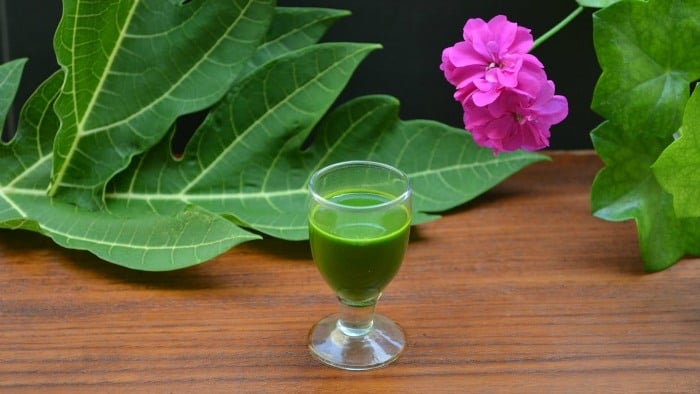
Since ancient periods, the juice of papaya leaves used to treat Thrombocytopenia and the conditions that cause a low platelet count in dengue fever.
Based on an experiment occurred in Srilanka on mice 2013, the juice of papaya leaves increases the Red Blood Cells and platelet significantly.
Another experiment was conducted in the same year on Dengue patients in Malaysia that the papaya juice also helps in Dengue Hemorrhagic fever.
How To Take Papaya Leaf Juice
- Take 2-3 fresh papaya leaves.
- Take 1-2 tsp, honey.
- Wash the leaves thoroughly in lukewarm water.
- Chop and crush them to make a paste.
- Add the honey to the paste.
- Take this paste twice daily when you are suffering from high fever.
- Continue this formula even after you get cured.
2.Giloy Juice
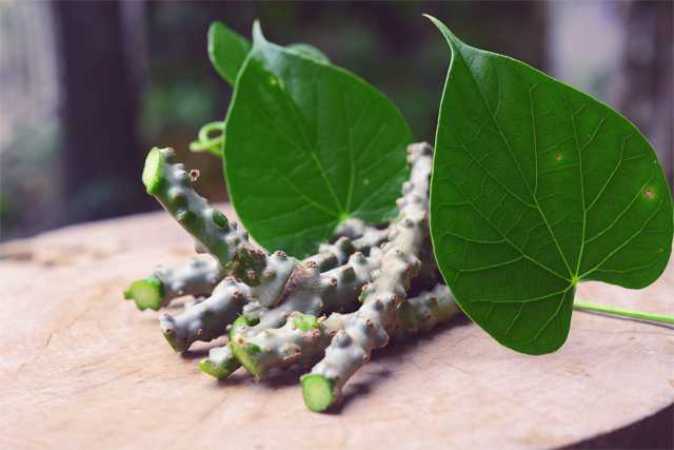
Giloy is a herb which helps in the increase of platelet count in dengue fever. Giloy has anti-rheumatic, anti-allergic, anti-inflammatory, and anti-bacterial properties which help you t get relief from body-pain during dengue fever. It also strengthens the immune system of your body to fight against this disease.
How To Take Giloy Juice
- Take 4-5 cm long stems of Giloy
- Take 4-5 Basil leaves
- 2-3 glasses of water
- Soak the stems in the water overnight
- Tale 2-3 glasses of water in a large bowl and add the soaked stem with basil leaves into the water
- Boli all the ingredients till the water remain half of the quantity
- Strain and keep the water to cool and take thrice daily
3. Wheatgrass Juice
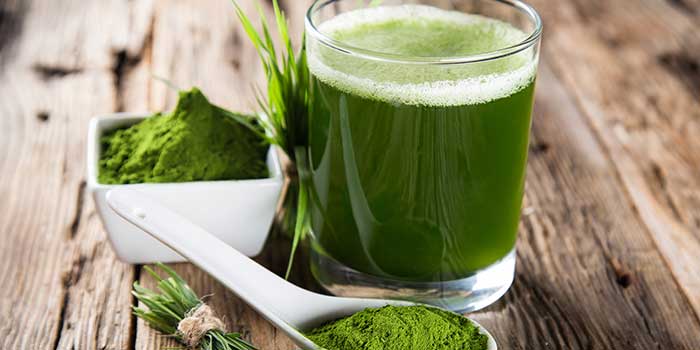
Wheatgrass is accepted as a super herb for ages. The medicinal value and anti-anemic properties present in wheatgrass help to treat when you are suffering from hematuria in dengue fever.
According to International Journal of Universal Pharmacy & Life Sciences, the juice of wheatgrass increases the platelet count miraculously in Dengue fever.
How To Take Wheatgrass Juice
- Take some wheatgrass and discard all the molds
- Chop the wheatgrass roughly and take half cup of it
- Crush the grasses in a blender to make a paste
- Now dilute the paste in water in a proportion of 1:2
- Take the solution 2-3 times in a day.
4.Aloe Vera Juice
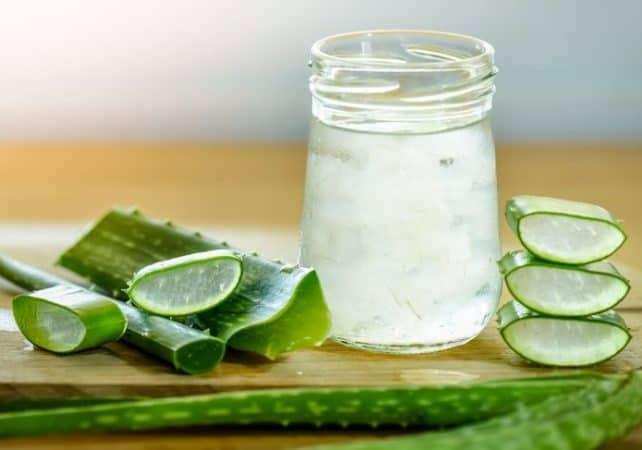
Aloe vera contains more than 200 components within itself from Amino acids to minerals and enzymes. It is believed as one of the miraculous herb gifted by mother nature.
The anti-viral, anti-microbial, antiseptic, and disinfectant properties present in Aloe vera work magically to decrease the infection and increase the platelet level in dengue fever. Aloe vera boosts the immune system of your body to fight against dengue fever.
How To Make Aloe Vera Juice
- Take the aloe vera leaves of 5 inches each
- Extract the fresh juices with a spoon
- Avoid the yellow part of the juice
- Add 2tsp of honey to the Aloe vera juice and take twice a day
5. Mixed Herbal Concoction
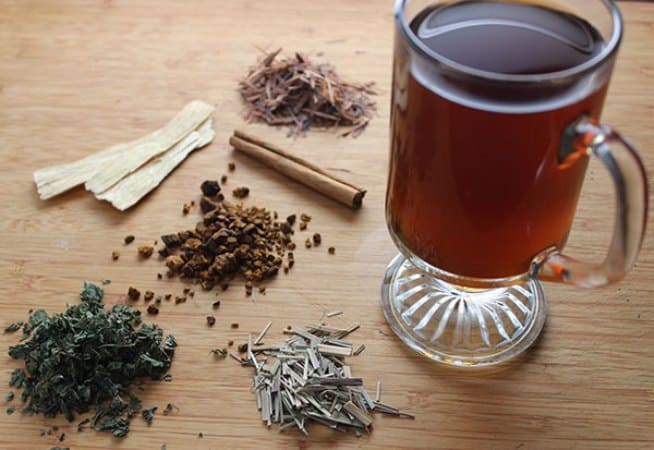
About all the herbal extracts we have discussed above helps in the treatment of Dengue fever. But the mixing of all the juices gives more benefit.
How To Prepare
- Take 1-2 papaya leaves and wash thoroughly.
- take 1/4 cup of chopped wheatgrass
- You have to take 1/2 a cup of Giloy juice
- Take 1/2 cup aloe vera juice
- 2-3 tsp lemon juice
- Take 2-3 tsp honey
- Make a juice of all the herbs in a blender except lemon and honey
- Now strain the juice and add lemon and honey
- Take half cup of the juice twice a day
A Soft Warning
It is strongly recommended that, consult your doctor before trying any of the herbal treatment we have discussed above.
Diet For Dengue-Affected Patients

The diet of a dengue patient must be of anti-inflammatory foods. These foods help to reduce the oxidative stress or inflammation in your body during dengue fever. The diet you will take in dengue must be of anti-oxidant foods. Let’s know about these foods in brief.
1.Foods Rich In Vitamin K
Vitamin K has anti-inflammatory properties which can help in blood clotting effectively. Vitamin k boosts the platelet count in the blood of a dengue patient and helps to bind the platelets with each other. So when you get affected by the dengue fever, it is advisable to take the foods which are rich in vitamin k. The vitamin k rich foods are:-
- Leafy greens such as Lettuce, Spinach, and Parsley.
- Brussels sprouts, Broccoli, and Cauliflower.
- Olive, and Soybean.
- Eggs
- Seaweeds
- Swiss Chard
- Kale
2. Omega-3 Fatty Acids
Foods rich in omega-3 fatty acids are one of the best sources of anti-inflammatory foods for the dengue-affected patients. Due to the decrease of platelet count in dengue fever the immune level of your body also decreases.
These foods boost the immune system of your body when you are affected by dengue fever by increasing platelet count.
The foods contain omega-3 fatty acids are
- Fish
- Walnuts
- Seaweeds
- Flaxseeds
- Flaxseed oil
- Eggs
3. Foods Rich In Vitamin B9
The foods rich in vitamin B9 help to increase the platelets by cell division in dengue fever. The foods contain vitamin B9 are
- Oranges
- Asparagus
- Spinach
- Whole Grain
4.Fruits & Vegetables Rich In Anti-oxidants
In dengue fever the immune level of your body decreases which causes a rapid decrease in platelet count in your blood. In this condition, doctors prescribe you to take steroids and anti-inflammatory medicines. The doctors also advise you to eat lots of fruits and vegetables which are full of anti-oxidants.
- Red Guava
- Nuts
- Blackberries, Blueberries, and Raspberries
- Sweet Potatoes
- Green Tea
- Beetroot Juice
- Orange colored vegetables like Squash and Pumpkins
- Dark Green Veggies
Restricted Foods In Dengue Fever
In dengue fever, you are advised to eliminate some foods which may decrease the platelet count in your body. These foods may aggravate your condition. Let’s know about these foods in brief.
1.Restrict Quinine-contained Foods
Doctors prescribe quinine contained medicines to the patients suffering from Malaria. Though some symptoms of dengue fever are quite similar to the symptoms of malaria, you are strictly prohibited to take quinine for dengue fever.
Even a small amount of quinine could be a big danger for you because quinine decreases the platelet count rapidly.
You must avoid the foods and drinks which contain even a little amount of quinine such as
- Lemon and Lime bitter
- Tonic water use for alcoholic drinks
2. Aspartame
Aspartame is a popular low-calorie sweetener which is dangerous when you are suffering from dengue fever. You must avoid the foods which contain Aspartame such as
- Energy Drinks and Diet Soda
- Protein Shakes and Coffee flavorings
- Sauces, Ketchup, dressings, and marinades
- Frozen fruit pops, chewing gums, and hard candy
- Jellies, Syrups, and breath mints which contain Aspartame as a sweetener.
- You must read the ingredients of processed foods that they are not containing Aspartame
Tips For Food & Lifestyle After A Dengue Fever
In dengue fever, the whole system of your body gets disturbed. The after-effects of dengue make you tired of both body and mind. You may feel lack of interest to do any work. The tiredness of body and mind makes you restless and lethargic.
But don’t worry my dears. A balanced diet and a disciplined lifestyle will make you fit and fine within a few days. You have to follow the tips given below.
- Take enough rest and sleep to keep you healthy.
- Keep away yourself from any stress or tension.
- Eliminate all the restricted foods from your diet discussed above.
- Avoid any junk foods and processed foods.
- Add lots of organic foods, fruits, and vegetables on your diet.
- Avoid eating the raw vegetable for some days. These vegetables can damage the linings of your intestine.
- Try to decrease eating tomatoes, onions, grapes, and garlic.
- Don’t take saturated fats and refined sugars.
- Strictly avoid alcohol and dairy products.
- Do mild but regular exercises which may improve your cardiovascular system.
- Follow the steps to boost your immune system.
- Protect yourself from cuts, scrapes, and bruising which may cause a bleeding.
- Don’t take any over-the-counter medicines without asking your doctor.
- Keep yourself hydrated. Drink plenty of water to keep your body safe from dehydration.
- Take balanced diet with lots of fruits and vegetables. Avoid meat, chicken, and pork for some days.
- Avoid exposure to sunlight which may cause fatigue.
Vaccine For Dengue Fever
On 15th April 2016, The World Health Organisation approved the 1st vaccine of Dengue fever known as Dengvaxia or CYD-TVD. It is a prophylactic viral vaccine of three dosages.
This vaccine is a result of the research of two decades by Sanofi Pasteur who is a french based scientist. It is approved for the people between 9-45 years of age.
Dengvaxia was 1st registered by Mexico in December 2015. This dengue vaccine was earlier licensed in four countries such as Brazil, Mexico, The Phillippines, and EL Salvador.
After the approval of WHO, some other developed dengue-prone nations are on the way to get the license of Denguvaxia.
Denvaxia is very effective in Dengue Haemorrhagic Fever. Almost 93% of severe cases are saved and, 80% of dengue patients reduced hospitalization after being vaccinated.
In 2017 the manufacturer of this vaccine has recommended that Dengvaxia will only be given to the people who are previously affected by a dengue virus.
As per WHO, Dengvaxia is not useful in the areas where the illness of Dengue fever is common. So it has become a challenge for the scientists to develop a particular vaccine or medicine for all the four types of DEN viruses. But some public and private researchers are trialing to develop several vaccines for the health experts.
Some more vaccines for dengue fever are also under clinical trial in the present.
Frequently Asked Questions
Q1. Who is at risk of Dengue fever?
Ans. Anybody who is bitten by an Aedes mosquito can be at risk of dengue fever.
Q2. When should I suspect Dengue?
Ans. When you have a sudden onset of high fever can reach to 104-105F accompanied by a severe headache.
Q3.How can we prevent epidemics of dengue fever?
Ans. Through awareness, it could be possible.
Q4. Is DHF curable?
Ans. Yes, it could be through intravenous fluid replacement.
Q5. Can a dengue infected mosquito transmit Zika virus to a human?
Ans. Yes, the same mosquito can cause Zika also.
Q6. Can dengue virus affect pets or livestock?
Ans. There is no such evidence till now.

